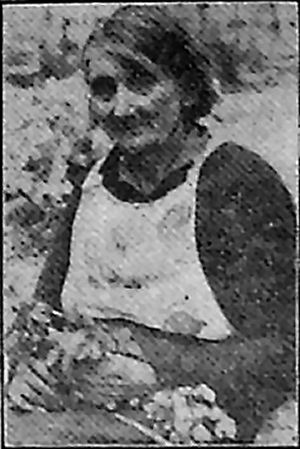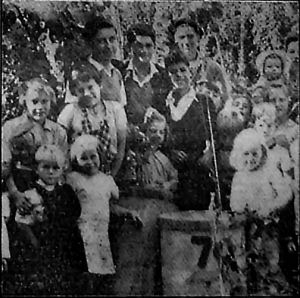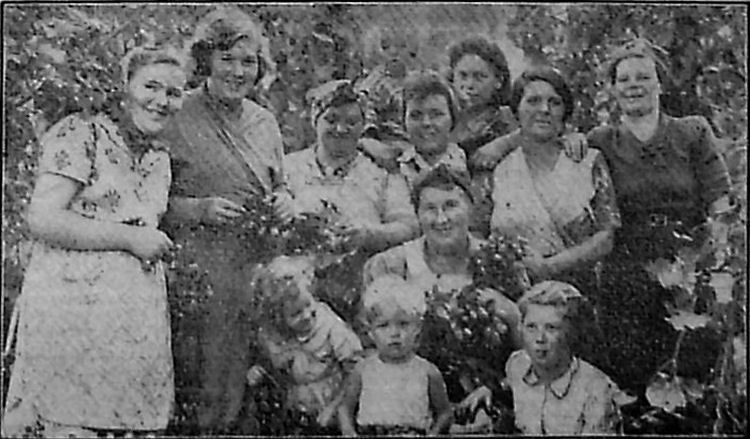|
From the Dover Express and East Kent News. 5 September, 1952.
A HOLIDAY WITH STRINGS
Working in the Hopfields
The hop-picking season, no doubt, keep a lot of children away from
their classrooms during the first fortnight of the autumn term, but
there is some slight measure of compensation to be gained from the
undeniable fact that hop-picking provides the youngsters with just about
the healthiest holiday they could possibly have.
Take a trip to any of the hop-gardens in the district and see for
yourself.
It's a children's paradise. There's the excitement of living in a
hut, of having meals cooked up on a camp-fire, of an almost unlimited
supply of fruit at their finger-tips, of an ice cream man always in
attendance and, until the thick heavily-laden bines are stripped, a near
perfect jungle in which to play.
And if children look upon this month as their real holiday away from
home, so, in very many cases, do mum and dad.
Ask them why they come hop-picking every year and you'll be surprised
to find how few of them start off by talking about money which is to be
earned. This is the family holiday to most of them.
It's one long glorious picnic to the kids, a complete change from the
every-day cares and worries for mum and, in most cases, light work for
dad with the incentive of a cheerful evening at the local pub when
picking for the day is done.
I paid a visit on Monday to Mr. Marchant's extensive hop plantations
set in the very heart of some of Kent's most glorious countryside
between Ash and Staple and hadn't the slightest difficulty in
discovering which was the "Dover Colony".
"Up the Lilywhites," halled one of the towns staunchest supporters.
Mrs. Norah Crascall, of Military Hill, when she spotted me, and my first
ten minutes in the hop garden were spent in trying to persuade Norah
that it was not my fault that the town side had not made a particularly
sparkling start to the season.
When a team did as well as Dover last season, Norah, for the life of
her, can't understand why they have to start making changes. "It's
absolutely barmy," she declares.
But back to hop-picking to introduce you to the "Granny" of the Dover
Colony - Old Mrs. Lil Daulton, from St. Radigunds Road, who has bee
going summer after summer to this same district for the past thirty-odd
years.
A trifle heard of hearing, she sits bolt upright on her hard wooden
chair, surrounded by her children and grandchildren, and sets a really
hot pace when it comes to stripping the bines.
Hop-picking is the one thing to which Mrs. Dalton really looks
forward during the whole year. She starts thinking about it long before
the others because she has been chosen as the basket-runner and it's her
job to recruit the army of local pickers for this particular garden.
 Mrs.
Dalton declares that it's a lot of nonsense for the authorities to say
that the parents should not be allowed to keep their children away from
school to go picking. Mrs.
Dalton declares that it's a lot of nonsense for the authorities to say
that the parents should not be allowed to keep their children away from
school to go picking.
"If they don't want them to go miss school they should put the summer
holidays back a couple of weeks," she says.
"It's the family holiday for these folks - the only holiday most of
them get in the year. They all get away together, spend a month in the
fresh air and, when it's all over, they go back home with a few pounds
in their pockets.
"That's how a good many families manage to have a holiday away from
home and earn themselves enough, at the same time, to fit themselves out
with clothes for the winter," says Mrs. Dalton.
The hop-pickers daily time-table was given to me by young George
Scopes from St. Radigund's who was beginning to wonder whether he had
acted prudently in taking his elephant-eared Alsatian dog, "Bruce."
Greatly displeased at being shut up in the Scope's hut while master
and mistress were out in the gardens, Bruce had gnawed his way out and
was lumbering round delightedly.
"You can't scold him, he's so friendly," said a nearby picker. "Look,
he likes the smell of my hops..... Get away, you horrid thing."
The huts, incidentally, can be made cosy and comfortable,
particularly if you care to follow George's example. He went out a
couple of days in advance and did some wall-papering.
In his hut was a wooden bed with straw palliates, a table and chairs,
and oil burner to provide some adequate lighting.
The day for him started at 5.30 a.m. with a wash in the open-air
while his wife cooked breakfast on the pressure stove. Breakfast was at
six o'clock sharp and then, with the rest of the colony, came the short
walk to the gardens, ready to start picking at 6.30.
Most of the pickers work through until five o'clock in the evening
with a brief break for an "on-the-spot" snack at mid-day. He big meal of
the day is in the evening (Mrs. Dalton had stuffed bullocks heart on
Sunday), and bed-time, usually about half-past ten, is generally
proceeded by a camp-fire. There is the camp-fire sing-song and seldom
any shortage of local talent.
They say it's good picking this year, particularly in this garden
where the crops look like being a record one.
"You can usually tell beforehand which gardens have good
crops," says Mrs. Pitman, of Lambton Road. "A lot of the regular pickers
scout around the district to find out where the hops are best before
they decide which gardens they will go to. There's been a rush for this
one this year."
For every tally of hops - and a tally is five bushels - a picker
receives about 6s.
A family of four adults, working at a comfortable enough speed to
allow dad to roll his own fags and for mum to enjoy an occasional gossip
can fill about ten tallies a day - which means that they can earn about
£2 10s between them per day.
They can work five-and-a-half days a week during the season which
lasts for about four weeks - or, in other words, the family can pick up
the very handy sum of about £50.
Deduct from that about £15 for mum's "housekeeping" - and it could be
considerably less if the ice-cream man wasn't always so close at hand -
and there is a useful purse left.
But, as I said earlier on, to a good many of these hop-pickers the
money side of the business doesn't take the first place.
"They're grand folk out here," says Mrs. Dalton. "They are out in the
fresh air all day long, they eat heartily and sleep soundly and they're
never short of good company. Who wants a better holiday than that?"
"And we're doing work of national importance," added George with a
lick of his lips.
I made a short stop at the "Volunteer" on the way home and heartily
agreed with him.
Stan Welta.

Above is shown a group of hop pickers from the St. Radigund's
district.
|